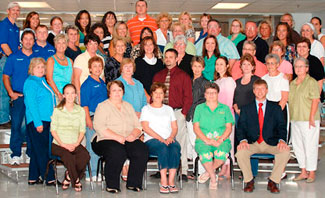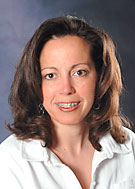
| ||||
Join the Club: How Professional Development Teams are Transforming Schools in Kentucky
By Dr. Rick Fisher with Melissa Towery

Bazzell Middle School Faculty and Staff
Over the past few years, state test scores at Bazzell Middle School students have risen consistently in all subject areas. Currently, more than 80% of the students in the school are performing at a proficient level, which exceeds the goal line established by the Kentucky Department of Education.
Teachers at Bazzell Middle School have transformed their classrooms through their dedication to bringing the latest best-practice-research to their students. Their commitment is a direct result of a new approach to collaborative learning, which we developed. during professional development with The Thoughtful Classroom. Each month our teachers meet to learn new strategies and share their experiences in professional development teams called Learning Clubs. The Learning Club process has transformed not only our faculty meetings, but also our school and our classrooms.
What is a Learning Club? Learning Clubs are made up of four to six teachers who meet regularly to discuss the use and refinement of instructional strategies. While many Learning Clubs follow a four-meeting structure, there is no set format that every school must follow. Learning Clubs can be customized to work for the teachers and administrators in any school.
At Bazzell Middle School, our Learning Clubs and meetings are designed in a way that best serves our staff. During our monthly Thoughtful Classroom meetings, Learning Club members spend the first part of the meeting reflecting on a teaching strategy or tool that they have successfully incorporated into their classrooms. After this initial reflection time, teacher-leaders introduce new pedagogical concepts (including new instructional strategies) for the entire Learning Club to discuss.
What Learning Clubs did for our school was change the dynamics and set the stage for the kind of serious collegial learning that has been fundamental to our recent success. To me, Learning Clubs are effective for three main reasons: First, they happen regularly, so everyone knows that this isn't something that's going to blow over in a month or two. Second, they emphasize shared responsibility for improving the school: the teachers, the teacher-leader, the principal, and The Thoughtful Classroom coaches all contribute to the success of the Learning Club. Third, Learning Clubs transform the role of the principal. Rather than an evaluator, I've become a partner in learning, someone whose job is to help teachers improve their practice. Put all these factors together and what you get is the ultimate support group for educators who want to test new strategies, refine their work, and improve teaching and learning in their individual classrooms and across the entire school.
To facilitate the planning and implementation of new strategies as well as deepen the analysis of student work, each member of the Learning Club receives a set of portfolios from the Thoughtful Classroom Portfolio Series. Each portfolio targets the development of a particular classroom tool or strategy and guides the Learning Club through the learning, planning, implementation, and reflection phases. These portfolios make the work of teachers, teacher-leaders, and principals easier by providing a ready-to-use format and a common building-wide (and district-wide) language for research-based improvement. In Bazzell Middle School, we're currently using the From Note Taking to Notemaking portfolio to anchor our professional development.
This constant sharing of ideas has made our school stronger. As we continue to arm our staff with the latest in research-based instructional strategies, our capacity to improve learning for all of our students will continue to grow.
Recent Results from Kentucky Core Content Test
(an element of the Commonwealth Accountability Testing System (CATS))The point scale for the Kentucky Core Content Test is 0-140. Kentucky legislation mandates that all schools must meet the goal of 100 points in all subjects by the year 2014.
While the Total Academic Index is not a true mean average of a school’s scores for a given academic year, since it takes into account other elements, it does provide a clear picture of where the school is currently regarding their ascent towards meeting the 2014 goal.
James E Bazzell Middle School |
|||||
| Subject | Academic Year '04-'05 |
Academic Year '05-'06 |
Academic Year '06-'07 |
Gain in Points (2004-2007) |
Points away from 2014 Goal (100) |
| Reading | 92.6 |
93.8 |
101.2 |
+8.6 |
+1.2 |
| Mathematics | 79.4 |
85.6 |
93.5 |
+14.1 |
-6.5 |
| Science | 76.0 |
85.2 |
93.6 |
+17.6 |
-6.4 |
| Social Studies | 75.2 |
85.5 |
98.6 |
+23.4 |
-1.4 |
| Arts & Humanities | 74.9 |
78.5 |
98.0 |
+23.1 |
-2.0 |
| Practical Living/Vocational Studies | 66.3 |
75.1 |
90.6 |
+24.3 |
-9.4 |
| Writing | 59.0 |
70.3 |
89.3 |
+30.3 |
-10.7 |
| Total Academic Index | 75.5 |
82.9 |
95.3 |
+19.8 |
|
Tips fromThe Thoughful Classroom:

 Shopping Cart:
Shopping Cart: 


